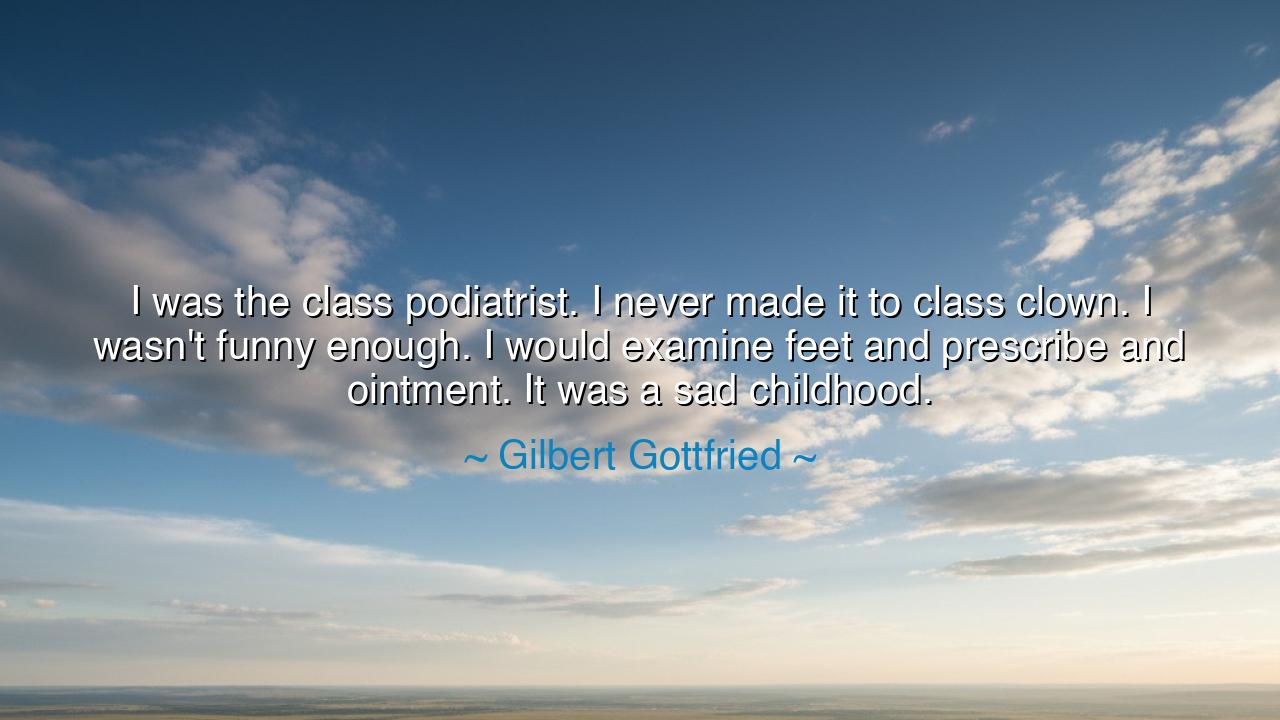
I was the class podiatrist. I never made it to class clown. I
I was the class podiatrist. I never made it to class clown. I wasn't funny enough. I would examine feet and prescribe and ointment. It was a sad childhood.






In the words of Gilbert Gottfried, “I was the class podiatrist. I never made it to class clown. I wasn’t funny enough. I would examine feet and prescribe an ointment. It was a sad childhood.” — there hides both jest and truth, laughter and loneliness intertwined. Like much of Gottfried’s humor, this line glimmers with irony, for behind the absurd image of a child examining imaginary feet lies a deeper meditation on belonging, insecurity, and the strange paths by which humor is born. What seems at first mere silliness becomes, upon reflection, a tale of how laughter often springs not from joy, but from the ache of wanting to be seen.
The class clown is the hero of childhood comedy — loud, adored, and fearless. To say “I never made it to class clown” is to confess a yearning to belong to that tribe of laughter, to stand in the bright circle of approval. But Gottfried, the future master of abrasive wit, tells us he began not as the jester but as the outsider — tending to imaginary ailments while others basked in attention. His humor, then, was not born in triumph, but in observation, in the quiet exile of one who watches the world’s absurdities from the margins. What he calls a “sad childhood” is the crucible from which his art emerged.
For every comedian, whether ancient or modern, the path to laughter runs through the valley of solitude. The philosopher Aristotle once said that humor arises from the recognition of incongruity — from seeing what others cannot, or dare not, see. The “class podiatrist,” in Gottfried’s tale, is precisely that figure: the observer who looks downward, toward what others ignore, finding comedy in the overlooked and the grotesque. While the class clown seeks applause, the future comic studies the human condition — its flaws, its deformities, its beautiful absurdity. In this way, Gottfried’s childhood “sadness” becomes the seed of insight.
There is a parallel in the story of Cervantes, who wrote Don Quixote, the world’s first great comic novel. Once a soldier and prisoner, he endured poverty and neglect, his youth filled with disappointment. Yet from that pain he forged the greatest laughter of his age — the tale of a man who believes himself a knight in a world that no longer believes in nobility. Like Gottfried’s child podiatrist, Cervantes transformed failure into wisdom, and loneliness into laughter. The comic spirit, he shows us, is not born in ease but in endurance — in the courage to find meaning, even in ridicule.
The origin of Gottfried’s remark lies in the essence of self-deprecation, the highest form of humor to the wise. To mock oneself is to steal the power of shame, to turn weakness into strength. In ancient courts, jesters survived by laughing first at themselves, shielding their truths behind masks of foolishness. So it was with Gottfried. By calling himself the “class podiatrist,” he makes light of his own awkwardness, yet also exposes a universal wound — the longing to be accepted for who we are, not who we pretend to be. Through humor, he transforms what once pained him into something that heals others.
The lesson, then, is one of resilience and perception. Not all who are denied the stage of laughter are silent forever. Some, like Gottfried, learn to listen in that silence, to study the world with the sharp eyes of the outsider. And when they speak — when their voice at last finds courage — their laughter carries depth, empathy, and truth. For the funniest souls are often those who once felt they weren’t funny enough. They have walked the long road from rejection to revelation, and their humor, forged in humility, becomes a bridge between hearts.
Therefore, my friends, when you feel unseen, when you are not chosen as the clown or the hero, take heart. The world’s laughter is not reserved for the loudest voice. It belongs also to the quiet ones, the observant ones, the podiatrists of the soul who notice what others overlook. Turn your sadness into art, your awkwardness into wisdom, your isolation into insight. For one day, those same wounds may become the source of light that makes others smile.
And so, as Gilbert Gottfried teaches through irony and laughter, even a “sad childhood” can yield profound joy. The class podiatrist may not win applause in the moment, but he learns something rarer — the anatomy of the human heart, its tenderness and its pain. And from that understanding, he builds a humor that does not mock life, but redeems it — laughter born not of cruelty, but of compassion, echoing softly through the ages like truth disguised as a joke.






AAdministratorAdministrator
Welcome, honored guests. Please leave a comment, we will respond soon